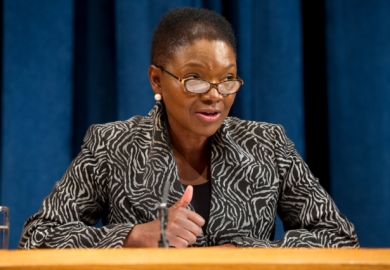SOAS University of London is curtailing academic research leave to reduce its salary costs in light of financial pressure.
The school, which describes itself as the world’s leading institution for the study of Asia, Africa and the Middle East, told staff last week that it would not approve any school-funded research leave for 2020-21, citing the “challenging financial environment” it faced.
In May 2019, Times Higher Education reported that the school’s director, Baroness Amos, had told trustees that the Bloomsbury institution would “exhaust [its] cash reserves” by 2021-22 unless it took action. It returned a £1.2 million deficit in its 2017-18 accounts.
Last August, SOAS said acceptances of new undergraduates had fallen by 8 per cent over the past two years, but claimed that its “finances are healthy” with a projected surplus of 3 per cent in 2022-23.
Under the new policy, permanent faculty who can apply for a term of research leave for every eight terms of service will not have any sabbatical approved in 2020-21.
But staff whose research leave is externally funded or already agreed will be allowed to take it, SOAS said.
With more permanent faculty available for teaching duties, it is likely that fewer temporary staff – known as “fractionals” – will be required, allowing for cost savings. However, SOAS said no decisions had yet been taken on budgets for fractional teaching staff.
In an email to staff on 21 January, Tom Armstrong, president of SOAS’ University and College Union branch, said the union had not been consulted about the change, which would “negatively impact staff morale and generate unmanageable workloads for already overstretched staff”.
“Ahead of the 2021 [research excellence framework] submission, this short-termist and short-sighted approach indicates a remarkable act of institutional self-sabotage,” said Mr Armstrong, who urged staff to join a lunchtime protest on 23 January.
“The suspension of research leave is symptomatic of the ongoing mismanagement of SOAS, where front-line staff are made to pay for the poor leadership of management,” he added, criticising “the opaque and callous” approach to decision-making at the top of the school.
SOAS claimed that the suspension of research leave was in line with its existing policy, which states that entitlement to leave was “not automatic but based on the merits of a proposal and the strategic needs of departments and the school”.
It also disputed claims published by the website Counterfire – which advocates “revolutionary socialism” – on 20 January that the Bloomsbury institution had “effectively sacked all its precarious academics in one fell swoop”.
The story, which said SOAS had “rescinded all research leave for permanent staff with immediate effect”, contained “references to SOAS [that] are not correct”, a SOAS spokesman said.
“We do not use zero-hours contracts for teaching staff at SOAS; no staff have been sacked; we continue to employ fractional staff for teaching; and research leave which is contractual or which is externally funded continues to be taken,” he told THE.
“Like all institutions, we are looking at how to ensure we make best use of our funds as we review departmental budgets for 2020-21.”
He added that SOAS – which, under Office for Student guidelines, was due to publish its 2019-20 accounts last month – was “currently finalising [its] accounts and will publish them in a time frame agreed with OfS”.
Lady Amos will leave SOAS this summer to become master of University College, Oxford.
Register to continue
Why register?
- Registration is free and only takes a moment
- Once registered, you can read 3 articles a month
- Sign up for our newsletter
Subscribe
Or subscribe for unlimited access to:
- Unlimited access to news, views, insights & reviews
- Digital editions
- Digital access to THE’s university and college rankings analysis
Already registered or a current subscriber?








